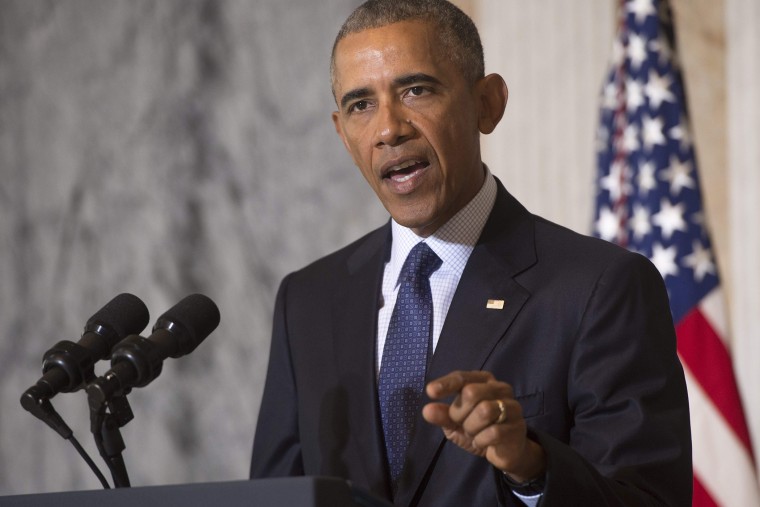In the wake of the deadliest mass shooting in American history, Republicans have raised plenty of questions about President Obama's counter-terrorism strategy. Today, he answered those questions in rather dramatic fashion.
"For a while now, the main contribution of some of my friends on the other side of the aisle have made in the fight against ISIL is to criticize the administration and me for not using the phrase 'radical Islam.' 'That's the key,' they tell us. 'We cannot beat ISIL unless we call them radical Islamists.' "What exactly would using this label would accomplish? What exactly would it change? Would it make ISIL less committed to try to kill Americans? Would it bring in more allies? Is there a military strategy that is served by this? The answer is none of the above. Calling a threat by a different name does not make it go away. "This is a political distraction.... There is no magic to the phrase 'radical Islam.' It is a political talking point. It is not a strategy."
The president went to explain that he's "careful" in his language, not because of political correctness, but because of a practical security strategy.
"Groups like ISIL and Al Qaida want to make this war a war between Islam and America, or between Islam and the West," Obama explaining, highlighting facts Republicans choose not to understand. "They want to claim that they are the true leaders of over a billion of Muslims around the world who reject their crazy notions.
"They want us to validate them by implying that they speak for those billion-plus people, that they speak for Islam. That's their propaganda, that's how they recruit. And if we fall into the trap of painting all Muslims as a broad brush, and imply that we are at war with the entire religion, then we are doing the terrorists' work for them."
The president then turned his attention to Donald Trump's ideas directly.
"Now, up until this point, this argument of labels has mostly just been partisan rhetoric, and sadly, we have all become accustomed to that kind of partisanship, even when it involves the fight against these extremist groups. "That kind of yapping has not prevented folks across the government from doing their jobs, from sacrificing and working really hard to protect the American people. "But we are now seeing how dangerous this kind of mind set and this kind of thinking can be. We are starting to see where this kind of rhetoric and loose talk and sloppiness about who exactly we are fighting, where this can lead us. "We now have proposals from the presumptive Republican nominee for president of the United States to bar all Muslims from immigrating into America. And you hear language that singles out immigrants and suggests entire religious communities are complacent in violence. "Where does this stop? The Orlando killer, one of the San Bernardino killers, the Fort Hood killer -- they were all U.S. citizens. Are we going to start treating all Muslim-Americans differently? Are we going to start subjecting them to special surveillance? Are we going to start discriminate them, because of their faith?"
The fear, of course, is that Trump may very well believe people of minority faiths should be treated differently, should be subjected to special surveillance, and should face discrimination.
Which is why Obama explained that such policies will actually make America less safe, by telling the world that ISIS is correct.
There's also the matter of history. "We have gone through moments in our history before when we acted out of fear, and we came to regret it," the president added. "We have seen our government mistreat our fellow citizens, and it has been a shameful part of our history."
Obama delivered a somber, sorrowful message on Sunday from the White House, but this was something very different. This was a president, irritated by partisan nonsense, urging his critics to grow up.
Regrettably, because Trump understands these issues so poorly -- he literally said the president should resign his office over word choice -- Obama's message today will probably go over the Republican's head.
